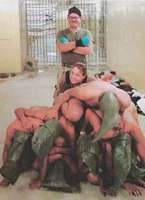Baghdad – and Busted!
In 1812, Napoleon invaded Russia, defeated the Russian army, arrived in Moscow and found that he didn't know what to do. Confronted by the Russian Winter and a hostile population, he packed his bags and went home. In 2003, the U.S. invaded Iraq, defeated the Iraqi army (such as it was), arrived in Baghdad and now don't know what to do. Confronted by a hostile population and facing a bitter guerrilla war, the US cannot yet pluck up the courage to leave, but leave they surely will.
|
|
Napoleon Bonaparte |
George W. Bush |
The 'Ledeen Doctrine'
Of late it has often been stated that though the Iraq military campaign was first class, there was no plan to handle the occupation. If the truth be told, the Iraq intervention has seen precious little planning from the very start. It was essentially Quixotic in origin, backed by no pressing reasons of state. In an article written shortly before the invasion ( Baghdad or Bust! ) I searched long and hard to find serious grounds for the invasion – but in vain. If at the time, I had heard of the “Ledeen Doctrine”, I would surely have called off the hunt for the casus belli snark. Jonah Goldberg in an article 'Baghdad Delenda Est' in the pro-war National Review gave the essence of the Ledeen Doctrine in the words of its originator Michael Ledeen: “Every ten years or so, the United States needs to pick up some small crappy little country and throw it against the wall, just to show the world we mean business.” This was evidently how Ledeen eloquently phrased it in a speech at the American Enterprise Institute about a decade ago. It's evident that after September 11 th 2001, this mentality got a hearing that otherwise would have been denied to it. Call me an old-fuddy-duddy if you will, but I make so bold as to state that random acts of violence do not make the basis for a sane foreign policy.
Pat Buchanan, a powerful and sane anti-war voice in the U.S. put the best gloss on American war aims in one of his columns.
“The neoconservative dream was to create a pro-American, free-market democracy in Iraq to serve as a model and catalyst for Arab peoples and convert Iraq into a base camp of American Empire, flanking Iran and Syria. It was to bring to power an Iraqi De Gaulle named Ahmed Chalabi, who would recognize Israel, build a Mosul-to-Haifa oil pipeline and become the Simon Bolivar of the Middle East.”
Put this way, it looks more like a fantasy than a dream. An anti-American people would become pro-American. A country with no experience of democracy would become a model democracy. A man who had no political constituency in Iraq and had not been there for over thirty years would come to power and form a rapprochement with the hated Israelis. Were these really the aims in the mind of the people who called for invasion, or were the neo-conservatives merely fully paid-up subscribers to the Ledeen Doctrine?
'Where did it all go wrong George'?The Iraqis were never going to throw flowers to the U.S. soldiers immediately after the invasion. Imagine that one bully has been oppressing you directly for a quarter of a century and a second has been bombing you on and off for 10 years and enforcing punitive trade sanctions against you. The second bully kicks the first one out and then, despite much chatter about liberation, installs a Viceroy in Baghdad and decides to stay on – along with 150,000 troops. How different from the time when France was truly liberated in the summer of 1944. Then it was de Gaulle, not Eisenhower who was installed as the head of the French government.
|
|
Ahmed Chalabi |
Vidkun Quisling |
After a year of occupation, the verdict is clear. Iraq has had little experience of free markets, less of democracy, and these institutions will not flourish when set against the background of a full-scale guerrilla war. Ahmed Chalabi has disappeared from the margin of history. He was not a Bolivar. Not even a Vidkun Quisling who at least had a brief opportunity to exercise power on behalf of his masters in Berlin.
The invasion and occupation has been regarded as discreditable by a large section of the world's population – from the Pope down. For most, it has had no more legitimacy than Saddam Hussein's invasion of Kuwait in 1990. Now, the p ictures from Abu Graib prison tend to have discredited the occupation in the eyes of the US and UK populations as well. It's difficult to take the moral high ground in the Middle East when such pictures are being flashed around the world. One photo shows a female American soldier, cigarette hanging from the corner of her mouth, posing cheerfully and pointing below the waist of a naked, hooded Iraqi prisoner. He is being forced to masturbate in front of her. Others show Iraqi prisoners, always naked and hooded, forced to simulate sexual acts or piled up in human pyramids.

Scenes from a Prison
The insurgents can no longer be written off as a mix of a few Saddam loyalists and foreign terrorists. To keep 150,000 troops tied down needs a little more than that. They know the United States can be beaten in this guerrilla war because they have made considerable progress already. Does anyone really believe that Paul Bremer would have gone, a puppet government installed and elections called if the Iraqis had dutifully accepted the occupation? The resistance knows that its destructive attacks over time have caused the American public to lose it enthusiasm for the Iraq War. A recent poll said that 60 percent of Americans now disapprove of the president's Iraq policy and don't believe that the invasion was worth the cost.
Some people bemoan the fact that the Americans have not yet won the hearts and minds of the Iraqi people. In fact, the crucial fight will be in the hearts and minds of the American people. The Iraqi insurgents must be pleased that in the age of 24-hour news, the Iraq War became unpopular in the United States much faster than the years needed to drain away American public support for the Vietnam conflict. Military experts say that the United States is winning tactically and that they can outgun the insurgents. But it never was in doubt that the militarily strongest power in the history of the world would be short of hardware. The U.S. is losing on the level of grand strategy. The Iraqi experience only repeats what went on in Vietnam. There, the United States won every battle and lost the war because the American public eventually became tired, disillusioned and exasperated with it.
The Iraqi insurgents have learned lessons from U.S. involvement in Vietnam and Somalia, the Israeli intervention in the Lebanon and the Soviet occupation of Afghanistan. The guerrillas will keep up their hit-and-run attacks until the stronger power becomes exhausted and leaves. In other words, if the guerrillas don't fight set-piece battles and lose decisively, they will eventually win.
The Iraqi insurgency has all of the prerequisites for a successful guerrilla operation. The insurgents need a sanctuary, a source of arms and supplies, and the support of a significant portion of the Iraqi people. Iraq's borders with Syria and Iran are so porous that jihadists from outside Iraq can infiltrate easily from sanctuaries in those nations to join native Iraqi fighters. Arms and supplies also are likely coming in from those nations. Syria and Iran may be actively providing them or looking the other way as they flow in from jihadist and other financiers around the world. Furthermore, Iraq is awash with weapons, and there are many unguarded arms and ammunition depots.
With a $500 billion deficit, the U.S. does not have the money for new wars. With an Army of 480,000 stretched across the globe, they are running short of troops. With April and May of 2004 costing the U.S. army a battalion of dead and wounded, it's hard to believe that the US public are willing to pay the price, especially when it's hard to see what they are getting in return.
The Future – Long TermAmidst the present shambles, old Middle East hands can be heard opining that a "three state" outcome for Iraq is now almost inevitable. The Shias are the majority population in Iraq, but it is argued that the Sunni townships will not submit to Shia authority, any more than will Kurdistan. The prospect in Iraq then, is of three separate states based on the ethnic and religious groups of Shias, Sunnis and Kurds.
So it is said by those fascinated by the drawing of lines on maps and designing of new flags. When I hear the wisdom of these nation builders, I want to sing out loud and long the virtues of a non-interventionist foreign policy. What will be the reaction of Turkey to a Kurdish state in the North? Won't they ally with the Sunni Arabs in Iraq to crush it? Will Iran call for an Anschluss with the Shias in the south of Iraq? What will be the reaction of the rest of the Arab world to this? How stands the axis of evil then?
I do not know the answer to these questions and I don't think that anyone else does either. In his personal life, a wise man will not undertake costly adventures where the outcome is unclear. So should it be with the foreign policy of governments.
British Foreign PolicyDespite the posturing of Prime Minister Blair, it is clear that the UK has been a footnote to this whole affair. Not since the Treaty of Dover in 1670 has British foreign policy been so subservient to that of another country. The war was unpopular with a significant section of the country, but still the government insisted on it. It was unpopular with a significant section of the ruling party, but still the government insisted on it. It has even been claimed that the U.S. government, sensing Blair's political problems, gave him the option of not sending troops to Iraq. He would have none of it. Blair's friends says the war gave him the chance to appear steadfast and resolute. But where is the virtue of being steadfast and resolute when you are stuck in a quicksand and everyone is telling you to get out?
There was strong opposition to the war in the UK, but this has hardly been reflected in parliament. In effect, British foreign policy is now in the hands of Blair and a small coterie of friends, little different from Washington where U.S. foreign policy is under the control of Bush and a small number of neo-conservatives. Historians have noted that after 1871, Bismarck ensured that German foreign policy was constitutionally a matter for the Kaiser and the Chancellor. In effect, Bismarck had de facto control and foreign policy would not be a matter to be decided by the German parliament. Such a concentration of power worked well when a genius like Bismarck was deciding foreign policy. It worked poorly when his less able successors failed to make the decisions which would have ensured German security before 1914.
|
|
Blair discusses war policy with an able lieutenant |
Otto von Bismarck |
Tony (five wars in six years) Blair lacks the knowledge and caution of a Bismarck and his idea of foreign policy seems to be to wait for the US Government to intervene somewhere in the word and then join in – fortissimo . And now he licks his lips at the prospect of a Federal European Superstate with yet more opportunities to put on his bossy boots. What a joy it would be for Blair to receive phone calls from both Washington and Brussels asking him to intervene in – say – North Korea and the Sudan, and all this before he had even finished his cornflakes. Dean Acheson famously remarked that Britain had lost an empire but not yet found a role. Blair has found that new role. Dispense with empire but send the gunboat anyway.
![]()
 Top 50 books of all time : by Old Hickory:-
Top 50 books of all time : by Old Hickory:-
"I have limited the selection to the books I have read. I keep to the norm of not recommending to others books I have yet to read. Clearly, books I have not read by now suggests a judgement of some sort."
Further reading
 The Great Illusion - Now
The Great Illusion - Now
Norman Angell,
"Simply the best exposition of the Classical Liberal case against war ever written."
You can buy this book secondhand from around £2.15 upwards
www.abebooks.co.uk
PDF version
of this page
![]()
baghdad2.pdf
Download
Requires Adobe
Acrobat Reader. This is
available
for free at
www.adobe.com
and on many free CDs.

The Alternative
Bookshop
Which specialises in,
but does not limit itself
to, books on Liberty
and Freedom ... Book
reviews, links,
bestsellers, rareties,
second— hand,
best price on books,
find rare books.

Laissez Faire
Books
The World's Largest
Selection of Books on
Liberty
|
|
|
|
|





